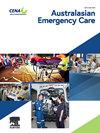Determinants of work stress among emergency department nurses in Sleman, Yogyakarta, Indonesia
IF 2.1
4区 医学
Q2 EMERGENCY MEDICINE
引用次数: 0
Abstract
Background
The nursing field is the fourth most stressful occupation in the health sector. Emergency department nurses often face crises and unpredictable situations that can negatively affect their quality of life and the quality of care. This study aimed to investigate the determinants of work stress among ED nurses in Sleman, Yogyakarta, Indonesia.
Methods
A descriptive cross-sectional study was conducted. Participants (n = 122) were emergency nurses recruited through convenience sampling from four EDs in Sleman District, Yogyakarta, Indonesia. Data were gathered using an online self-administered survey consisting of the workload, self-efficacy, and work stress questionnaires. Hierarchical linear regression analysis with the entry method was used to examine the main determinants of work stress.
Results
The average work stress (38.29 ± 8), workload (30.83 ± 9.21), and self-efficacy (32.47 ± 3.61) scores were at a moderate level. Hierarchical linear regression showed that workplace, being a head nurse, and workload were the main determinants that contributed to 25.4 % of work stress among ED nurses.
Conclusions
The study results confirm that having a high workload, working in a private hospital, and being a head nurse are the main determinants of work stress among ED nurses in Sleman, Indonesia.
印度尼西亚日惹苏莱曼市急诊科护士工作压力的决定因素。
背景介绍护理领域是卫生部门第四大压力职业。急诊科护士经常面临危机和不可预测的情况,这可能会对她们的生活质量和护理质量产生负面影响。本研究旨在调查印度尼西亚日惹市 Sleman 的急诊科护士工作压力的决定因素:方法:进行了一项描述性横断面研究。参与者(n = 122)是通过方便抽样从印度尼西亚日惹市斯莱曼区的四家急诊室招募的急诊室护士。数据收集采用在线自填式调查,包括工作量、自我效能感和工作压力问卷。采用分层线性回归分析法研究工作压力的主要决定因素:工作压力(38.29 ± 8)、工作量(30.83 ± 9.21)和自我效能感(32.47 ± 3.61)的平均得分处于中等水平。层次线性回归显示,工作场所、担任护士长和工作量是造成急诊室护士工作压力的主要决定因素,占 25.4%:研究结果证实,工作量大、在私立医院工作和担任护士长是印尼斯莱曼市急诊室护士工作压力的主要决定因素。
本文章由计算机程序翻译,如有差异,请以英文原文为准。
求助全文
约1分钟内获得全文
求助全文
来源期刊

Australasian Emergency Care
Nursing-Emergency Nursing
CiteScore
3.30
自引率
5.60%
发文量
82
审稿时长
37 days
期刊介绍:
Australasian Emergency Care is an international peer-reviewed journal dedicated to supporting emergency nurses, physicians, paramedics and other professionals in advancing the science and practice of emergency care, wherever it is delivered. As the official journal of the College of Emergency Nursing Australasia (CENA), Australasian Emergency Care is a conduit for clinical, applied, and theoretical research and knowledge that advances the science and practice of emergency care in original, innovative and challenging ways. The journal serves as a leading voice for the emergency care community, reflecting its inter-professional diversity, and the importance of collaboration and shared decision-making to achieve quality patient outcomes. It is strongly focussed on advancing the patient experience and quality of care across the emergency care continuum, spanning the pre-hospital, hospital and post-hospital settings within Australasia and beyond.
 求助内容:
求助内容: 应助结果提醒方式:
应助结果提醒方式:


